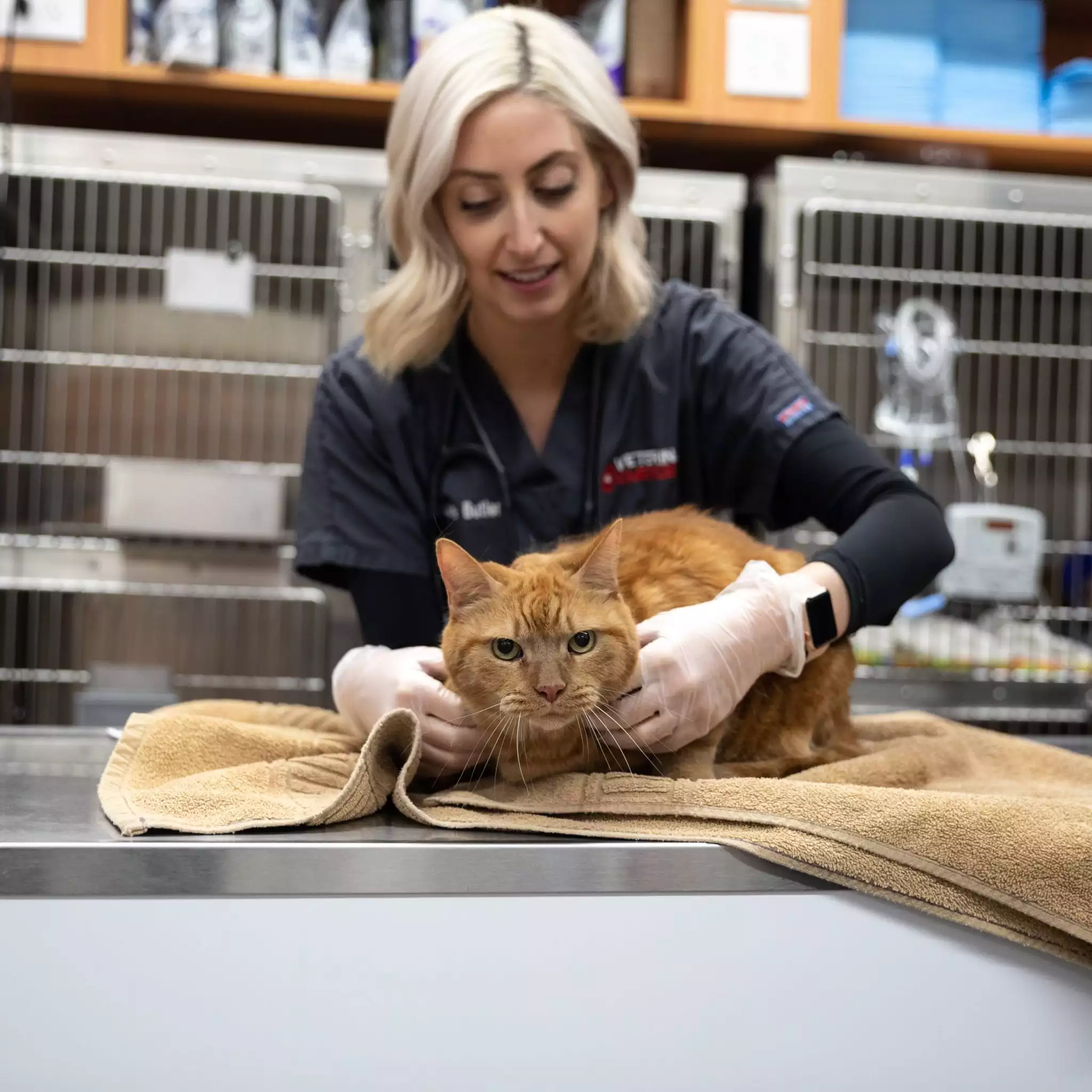
How to Know When to Take Your Cat to the Emergency Vet
Dr. Lauryn Benson
Call & Speak with a doctor Open 24/7, Even Holidays!
Walk in today for:
Emergencies
Point-of-Care Ultrasound
Urgent Care
X-Rays
Diagnostics + Testing
End-of-Life Care
Surgery
Treatment + Hospitalization
Is your cat in the middle of a crisis, leaving you unsure of what to do next? Or are you just trying to do some research to help you better understand how to care for your feline friend if anything unexpected should happen? As a cat owner, you don’t want to think about having to rush your pet to the emergency vet. However, this is sometimes an unfortunate necessity, and it’s good to know which conditions and situations might require a trip to the emergency vet in the middle of the night.
Check out the information below to educate yourself on cat emergencies. Understand that this list is not a comprehensive one, but it does cover most of the basics and should give you an idea of how to respond if something is going wrong with your cat. This information can help you prepare for the worst, even though you will hopefully never have to face this type of situation.
Signs You Need to Take Your Cat to the Emergency Vet
Below are signs that it’s time to take your cat to the emergency vet immediately:
Breathing Trouble
If your cat is struggling to breathe in any way, head to the emergency vet. Particularly look for a changes in tongue color (pale or blue tinged) or gum color (pale or blue tinged).
Collapsing or Inability to Wake Up
If your cat suddenly collapses, or if he/she has gone to sleep and you can’t get him to wake up, then they need to see an emergency vet immediately.
Frequent Vomiting
Vomiting itself is not an emergency condition in cats, but many vomiting episodes within a couple of hours can be. Vomiting has many different underlying causes and can result in dehydration if left untreated.
If you are concerned about the amount or frequency of vomiting, call and speak with the vet.
Long-Lasting Abdominal Discomfort
Cats may develop abdominal pain for many reasons. If your cat shows signs such as arching his or her back constantly or breathing heavily even when the temperature is not too warm, he or she may have abdominal pain. If this lasts longer than thirty minutes, you should see an emergency vet.
When Your Cat Can’t Urinate
Cats who try to urinate and can’t produce urine or cry in pain when they go to the litterbox need to get to the vet quickly, as this can be a life threatening emergency.
Having a Seizure
Seizures are quite dangerous in cats and should be considered an emergency.
Poisoning
If you know your cat has eaten something toxic, take him to the emergency vet without waiting for signs of poisoning. If you are unsure if it is poisonous, you can contact a veterinarian or a poison control hotline.
Accident
Similarly, contact the emergency vet if you know your cat has suffered an accident or trauma of some kind that is severe enough not to wait until morning. If in doubt, don’t wait to see an after hours vet!
Heatstroke
Cats generally breathe through their noses, so if they are breathing with their mouths open or panting this is a concern and they should be assessed quickly.
Paralysis in One or More Limbs
If your cat suddenly shows signs of paralysis in one or more limbs, it’s time to go to the emergency vet. This could indicate a problem with that limb, or it could mean your cat is having heart or clotting issues.
Crying When Being Touched
Cats who are in pain will usually cry when they’re touched. A sudden onset of this type of behavior may mean you should take your cat to the emergency vet, especially if it is paired with anything else from this list.
“Wait and See” Symptoms of A Cat Emergency
These symptoms are less dangerous but can still be cause for a visit to the emergency veterinarian.
Redness and Watering of Eyes
This could be a sign of allergies. However, it could also be a sign of an eye infection.
Give it a day and see if it starts to clear up, but schedule an appointment with the vet if it isn’t showing signs of improvement (or has gotten worse) by then. If your cat is squinting they should be seen and should not wait.
Frequent Sneezing in Cats
This is another symptom that is most likely related to allergies. Once again, however, it could be a bacterial or viral infection, and your vet may need to check your cat to be sure.
Wait to see if it gets better in a day or two. If not eating accompanies these symptoms, however, get to the vet immediately.
Intermittent Vomiting
Cats tend to vomit more often than dogs (or humans). If your cat spits up hairballs now and then, this is normal. However, if you notice an increase in the number of times your cat vomits on a weekly or monthly basis, then it’s probably time to get to the vet.
Diarrhea
If your cat has one episode of diarrhea you can wait and see if they improve. If it doesn’t or it becomes worse, head to the vet, or your cat may become dehydrated.
Sudden Changes in Behavior
Any sudden and unexplained changes in your cat’s behavior may warrant a vet trip, but they can also be monitored before rushing to an emergency vet. Consider, too, whether or not there are reasons for this behavior change. For example, if you have recently brought home a new pet, your cat may stop eating for a day as he or she adjusts.
If any strange behavior persists over several days, you should see a veterinarian.
When In Doubt About Your Cat, Call The Emergency Vet
If you do feel like your cat is having a crisis that cannot wait until your normal vet is available again, then call the emergency vet right away. They will give you instructions for bringing your cat in and will let you know what to expect when you arrive. Only you can make the decision as to whether or not your cat needs emergency vet care. By keeping the information above in mind, you should be able to make that choice much more easily.
If you’re cat is displaying any of the symptoms mentioned above, call VEG right away. We offer after-hours emergency care for cats. You can call or visit any of our locations to speak with a vet about your cat emergency.

